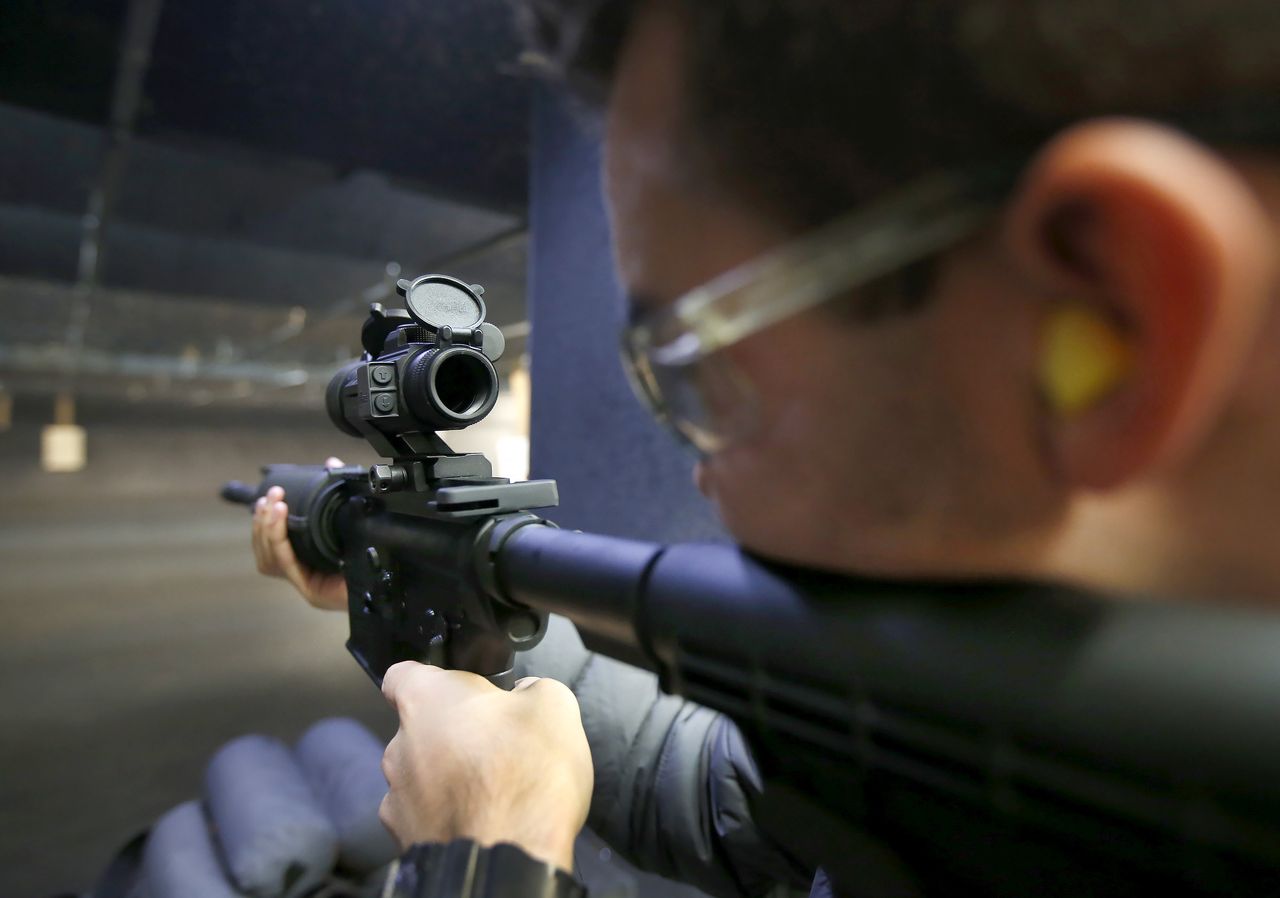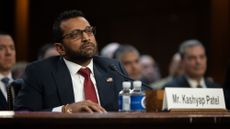America, armed and dangerous
Would tighter gun control laws reduce America's unparalleled levels of gun violence?

Would tighter gun control laws reduce America's unparalleled levels of gun violence? Here's everything you need to know:
How severe is the problem?
It's worse than in any other nation in the civilized world. Every day, an average of 300 Americans are shot. There were 36,252 firearm deaths in the U.S. in 2015 — including 22,018 suicides and 12,979 homicides — and at least 85,000 injuries. Every day, an average of nearly two women are shot dead by their partners. Nearly 6,000 children are shot each year, a fifth accidentally, with 1,300 fatalities. Since 1982, there have been 81 mass shootings — using the definition in which four or more victims die in a public incident — including three this year. (Under an alternative definition of four or more people shot in one incident, there have been 273 mass shootings so far this year.) Over the past 50 years, more Americans have been killed by guns than in all the wars in the nation's history. The U.S. "suffers disproportionately from firearms," says Erin Grinshteyn, author of a recent study on U.S. gun violence. "They are killing us rather than protecting us."
Subscribe to The Week
Escape your echo chamber. Get the facts behind the news, plus analysis from multiple perspectives.

Sign up for The Week's Free Newsletters
From our morning news briefing to a weekly Good News Newsletter, get the best of The Week delivered directly to your inbox.
From our morning news briefing to a weekly Good News Newsletter, get the best of The Week delivered directly to your inbox.
Does gun control work?
The majority of research here and abroad strongly indicates that while gun restrictions are no panacea, they do reduce the casualty count. A 2016 Columbia University review of 130 studies in 10 countries concluded that passing new gun laws generally leads to a significant drop in homicides and suicides. State laws point to the same conclusion: Most of the states with the highest rates of firearm deaths, such as Alaska and Louisiana, have loose restrictions; most of those with the lowest rates, such as Massachusetts and Hawaii, have much stricter laws. Firearm assaults are 6.8 times more common in the states that have the most guns, compared with those that have the fewest. Since Australia responded to the 1996 Port Arthur massacre by banning semi-automatic rifles and shotguns, requiring that all weapons be registered, and buying back about 700,000 guns from citizens, firearm homicides have plunged by more than 50 percent — and the country hasn't had another mass shooting since. For years, gun control advocates have cited these statistics in arguing for stricter federal gun control laws in the U.S.
What have they proposed?
The most popular proposal — one supported by 85 percent of gun owners — is to expand mandatory background checks to all firearm sales, not just those involving licensed dealers, to make it harder for criminals and the mentally ill to buy firearms at gun shows or directly from individual sellers. Currently, 1 in 5 gun sales is completed without a background check. Two other possible measures are barring gun sales to people who have been arrested for domestic violence and barring sales to those on terrorist watch lists; both are opposed by the National Rifle Association (NRA) on due process grounds. Democratic lawmakers have tried without success to outlaw high-capacity magazines, which enable shooters to fire as many as 100 bullets without reloading, after they were used in the massacres at Newtown, Aurora, and Las Vegas. But all of these proposals, as well as proposed bans on assault-style weapons also recently favored by mass shooters, have been blocked by gun rights advocates.
On what grounds?
The NRA and other opponents of restrictions argue that violent crime rates have dropped about 50 percent over the past two decades — a period when the number of guns in the country has steeply increased, to about 310 million. (The proportion of households with guns has dropped dramatically, however, from 53 percent in 1994 to 36 percent last year.) The government's National Crime Victimization Survey has calculated that Americans brandish or fire guns in self-defense at least 65,000 times a year; gun rights advocates claim many more incidents go unreported, and that criminals are deterred merely by the prospect that a potential victim might be armed. The NRA says "the only way to stop a bad guy with a gun is a good guy with a gun" — although a 2014 FBI study found that in 160 "active shooter" incidents, armed members of the public stopped the gunman only once.
Could more gun laws be passed?
Republican lawmakers say they might support a ban on the bump stock, the device Las Vegas shooter Stephen Paddock used to fire his semi-automatic rifles like a machine gun. But few dare cross the powerful NRA, which campaigns hard against politicians who back any gun law. At its heart, America's gun control debate is a conflict over culture and rights. Gun rights advocates insist restrictions would intrude on law-abiding citizens' constitutional right to bear arms, and with little impact on the criminal use of weapons. Gun control advocates argue that all rights are limited to some extent, and that reasonable restrictions would be justified even if they only incrementally reduced the death toll, saving a few hundred or few thousand lives a year. "No one law is going to say, 'Hey, now we've eliminated this problem,'" says David Hemenway, who has extensively studied gun control at the Harvard T. H. Chan School of Public Health. But "if you did a lot of things, it would be a great help."
Crossing the NRA
Republican politicians aren't the only ones who dare not defy the NRA. In 2000, Smith & Wesson agreed to a deal with the Clinton administration to develop a "smart" gun and help prevent firearms from falling into criminals' hands. The NRA was incensed. Denouncing the company as "the first gunmaker to run up the white flag of surrender," the organization released the CEO's phone number and encouraged its members to complain. So many death threats followed — "I'm a dead-on shot," one caller told him — that another executive took to wearing a bulletproof vest. When the NRA then initiated a boycott of Smith & Wesson, it prompted a sales drop-off so severe that two factories temporarily shut down, and the company's stock plunged 95 percent in 10 months. Smith & Wesson has since repaired its relationship with the NRA — and hasn't forgotten its ill-fated attempt to compromise. "It almost took down the company," says current CEO James Debney. "We won't make that mistake again."
Sign up for Today's Best Articles in your inbox
A free daily email with the biggest news stories of the day – and the best features from TheWeek.com
-
 New FBI Director Kash Patel could profit heavily from foreign interests
New FBI Director Kash Patel could profit heavily from foreign interestsThe Explainer Patel holds more than $1 million in Chinese fashion company Shein
By Justin Klawans, The Week US Published
-
 Magazine solutions - February 28, 2025
Magazine solutions - February 28, 2025Puzzles and Quizzes Issue - February 28, 2025
By The Week US Published
-
 Magazine printables - February 28, 2025
Magazine printables - February 28, 2025Puzzles and Quizzes Issue - February 28, 2025
By The Week US Published
-
 'Seriously, not literally': how should the world take Donald Trump?
'Seriously, not literally': how should the world take Donald Trump?Today's big question White House rhetoric and reality look likely to become increasingly blurred
By Sorcha Bradley, The Week UK Published
-
 Will Trump's 'madman' strategy pay off?
Will Trump's 'madman' strategy pay off?Today's Big Question Incoming US president likes to seem unpredictable but, this time round, world leaders could be wise to his playbook
By Sorcha Bradley, The Week UK Published
-
 US election: who the billionaires are backing
US election: who the billionaires are backingThe Explainer More have endorsed Kamala Harris than Donald Trump, but among the 'ultra-rich' the split is more even
By Harriet Marsden, The Week UK Published
-
 US election: where things stand with one week to go
US election: where things stand with one week to goThe Explainer Harris' lead in the polls has been narrowing in Trump's favour, but her campaign remains 'cautiously optimistic'
By Harriet Marsden, The Week UK Published
-
 Is Trump okay?
Is Trump okay?Today's Big Question Former president's mental fitness and alleged cognitive decline firmly back in the spotlight after 'bizarre' town hall event
By Harriet Marsden, The Week UK Published
-
 The life and times of Kamala Harris
The life and times of Kamala HarrisThe Explainer The vice-president is narrowly leading the race to become the next US president. How did she get to where she is now?
By The Week UK Published
-
 Will 'weirdly civil' VP debate move dial in US election?
Will 'weirdly civil' VP debate move dial in US election?Today's Big Question 'Diametrically opposed' candidates showed 'a lot of commonality' on some issues, but offered competing visions for America's future and democracy
By Harriet Marsden, The Week UK Published
-
 1 of 6 'Trump Train' drivers liable in Biden bus blockade
1 of 6 'Trump Train' drivers liable in Biden bus blockadeSpeed Read Only one of the accused was found liable in the case concerning the deliberate slowing of a 2020 Biden campaign bus
By Peter Weber, The Week US Published